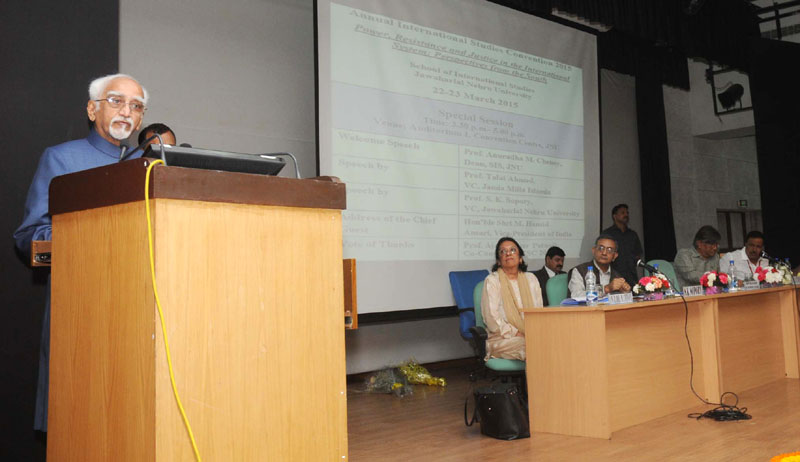

The Vice President, Mr. Mohd. Hamid Ansari addressing at the ‘Annual International Studies Convention’ on the theme “Some Thoughts on the Sacred and Secular in International Relations” organised by the School of International Studies, Jawaharlal Nehru University, in New Delhi on March 23, 2015.
Vice President Addresses at Annual International Studies Convention at JNU
New Delhi (PIB-GR-TYP-BIN): The Vice President of India Mr. Mohd. Hamid Ansari said that Secularism is a modality, not a dogma. Historically speaking, the term surfaced in the middle of the 19th century when the British publicist George Holyoake expressed it to describe his view of promoting a social order separate from religion without actively dismissing or criticizing religious belief.
Addressing at the ‘Annual International Studies Convention’ on the theme “Some Thoughts on the Sacred and Secular in International Relations” organised by the School of International Studies, Jawaharlal Nehru University on March 23, he said that since then, different societies have developed their own versions of it in theory and practice. Some of these in the Western world premised on homogenous, single-religion, citizen bodies are today facing challenges from emigrant communities of other faiths; as a result, ‘this new multi-religiosity is threatening to throw western secularism into turmoil.’
He opined that Religion in statecraft has been used for different purposes and objectives: as an instrument of regime legitimacy, for justifying the status quo in terms of policies and postures, for a politically mobilizing role to articulate dissent. We thus come across instances of religiously relevant or religiously conditioned political action as also of politically relevant or politically conditioned religious action. Each has an impact on the circle of inclusion or exclusion.
The Vice President said that in this perspective, a number of questions do arise. Since religious precepts having a societal impact are being used in politics by state and sub-state actors for the formulation or advocacy of state policies, what is the nature of these policies? Do they impinge on or violate constitutional, bilateral or multilateral commitments of the state? Does religion have, in any sense, a role in international relations? Is it similar to the ideological battles that characterised the world in the Cold War period? If so, what are its implications for inter-state relations generally, and for regional or global stability specifically?
He said that answers to these appear to be in the affirmative. States and sub-state actors professing a religion-based ideology do tend to read it with varying intensity in both domestic and external policy perceptions and practices. Such projections are increasingly at variance with the accepted norms of international conduct. Local, regional and global considerations do lead to situations in which such policies are viewed as a source of tension.
(Source: PIB/GR/TYP/BIN/USPA/WN)
